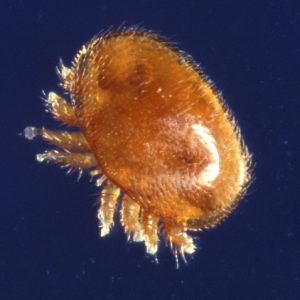(Queensland Government News Release)

Varroa mites have been detected in North Queensland at the Port of Townsville, and Biosecurity Queensland is implementing a surveillance program to prevent any spread of the mite. The mites’ most likely entry path into Australia was on a feral swarm of Asian honey bees arriving at the port.
The Department of Agriculture and Fisheries has movement restrictions for bee risk items following the detection of varroa mites on a feral Asian honey bee hive in Townsville. To move restricted items, please refer to the Movement Control Order and for more information read Moving bees and hives. Report sightings of feral hives, Asian honey bees or hives showing symptoms.
Now found in much of Asia, Europe, the USA, South America and New Zealand, Varroa destructor has caused the collapse and death of European honey bee colonies wherever it is present. Adult bees are weakened by mites sucking on them, and new bees are born with deformities. (Initial government reports seem to indicate that this is the less serious Varroa jacobsoni, not Varroa destructor that has done so much damage in the U.S. and Europe.)
Varroa mite numbers build up over time, eventually killing honey bee nests and hives if chemical mite killers are not applied. Bee colony death affects honey production and pollination of food crops.
The varroa mite is prohibited matter under the Biosecurity Act 2014.